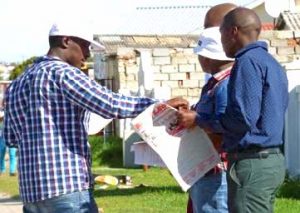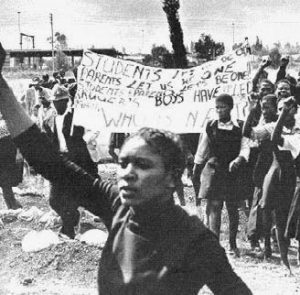Young Comrades give Communist Leadership here ♦ Lessons from anti-apartheid struggle here ♦

Rebellions in South Africa: Young Comrades Step Up to Give Communist Leadership
SOUTH AFRICA, July 13—Riots have broken out around the country, sparked by the jailing of the popular former South African President, Jacob Zuma. No political party is leading this. The real causes were already there. Zuma’s jailing was just the spark.
Once a significant part of the population, especially young people, is out of work, there will be consequences. Officially, youth unemployment is around 40%, but the number is much higher since that does not include those who have given up looking for work.
On top of that is the lockdown, with no plan in place for people to get basic services delivered to them, like food parcels. The government simply expects people to lock themselves up while they and their children go hungry. This ticking time bomb is the reality of capitalism during the pandemic.
You see by the level of looting that people are hungry. Retail shops are looted because people need food. Some take televisions to sell for money for basic necessities.
In some instances, there are tribal divisions between the Zulus and the Xosas, but this is largely a national event. It has spread to other provinces, to Pretoria, and even the Eastern Cape.
The army and the riot police are deployed to try to enforce some so-called “law and order.” They have not been able to control the many thousands of young people who are desperate and have no alternative.
We must provide the alternative. This kind of anger resonates with mobilizing to end capitalism with communist revolution. It also shows that people will really rise up against this system. We see young people fighting back against police around the world. But they need communist leadership.
As the International Communist Workers’ Party, we need to have a presence on the ground so we can give leadership around our communist ideas. Now there are just riots with no political direction.
Now it’s no longer about releasing Zuma but about the lockdowns. Governments are acting like feudal kings—telling people on national TV what to do, and what not to do.
Capitalism and its democracy are a dictatorship of the minority over the majority. This has to change. The majority, the working class, has to dictate its own terms. We need to be more proactive in organizing here for communism.
Even in Port Elizabeth there have been some instances of looting. The situation is tense. We plan to organize at the taxi rand and other places to distribute “Mobilize the Masses for Communism” and Red Flag directly to the masses. This needs to happen wherever we can. Unfortunately, we don’t have a presence in KwaZulu-Natal and Gauteng, where the riots started.
Most young people are hungry for our ideas. We have seen this often, like in the march about Palestine, where we distributed 150 Red Flags in a short time. We need to show more agency in our organizing, to focus on young people and also industrial workers. Everything is on standstill. It’s mostly workers who are on the street. Most of them have been recently retrenched or laid off because of the pandemic.
As a collective we will do our utmost to take advantage of this capitalist crisis. It’s not just about Zuma, but legitimate grievances by young people and the working class who are rejecting the status quo. People are calling for change. We need to present young people with communism as the only solution to capitalism’s attacks.
Learning from the Anti-Apartheid Struggle: Youth Need Communism
CAPE TOWN (South Africa), June 16 – The June 16 celebrations symbolise a very important day in the history of the apartheid struggle. Thousands of youths from schools across the country revolted against oppressive education by the white racist capitalist government. Most notable was the Soweto uprising, the result of students’ and youths’ mass struggle and consciousness.
These events made history, but the struggle failed to meet the masses’ aspirations of eliminating oppression and exploitation. However, it gives us communist lessons.
This June 16, comrades had youth day celebrations, including the collective here. We hosted the meeting with two comrades and one old comrade who relocated to Cape Town. The meeting discussed the historical events of the day and the lessons from it, and also organizing the collective activities going forward.
The Soweto revolt failed as a result of the wrong ideology of black consciousness in combination with narrow reformism, even though such reformism was covered in revolutionary rhetoric. Ultimately the uprising was fueled by capitalist racist oppression, but it was organised under the ideology of black consciousness, with a narrow focus on reforming Bantu education. This education under apartheid mandated segregated, inferior schools in the segregated areas where black people were forcibly moved.
Black consciousness advocated for African socialism. It didn’t advocate for dismantling of the entire capitalist society, which is needed. It was based on the ideas of nationalism and socialism, which really meant the dangerous illusion of trying to make capitalism serve the oppressed masses.
However, we take lessons and inspiration from the experiences of the 1976 youth. Their courage and ability to organise show the possibility and the role young people can and must play in revolutionary change.
As a young collective, we must deepen our commitment and intensity mobilising the masses for communist revolution today. Only communist revolution can end racism, unemployment, miseducation and all exploitation of the masses.
We face the great challenge of recruiting other young people and workers. This is a long-term struggle, with no shortcuts. Struggling with new comrades’ contradictions and wrong ideas takes time. Some new comrades pledged to join and be active members of the party, then reversed their commitment.
We do not give up on those comrades. We know from dialectics that development and growth are not linear. We know change is not always visible when it’s in the process of happening. We are struggling with contradictions that new comrades usually have, who are fed up with capitalism, particularly about reform ideas.
We understand the importance of youth, especially in South Africa, where high unemployment can turn youth to crime, drugs and gangsterism. The lessons from the June 1976 uprisings show that with intensity and commitment we can recruit these youth towards revolutionary change.
Socialism and reform failed to meet the masses’ needs. Inequality has left millions of young people in poverty.
That means we recruit directly for communism, a society with no money, profit or exploitation. We plan to utilize the opportunities represented by capitalist contradictions.
The mood for a revolution is there. Young people are burning and rioting in KwaZulu-Natal and Gauteng, riots spreading nationwide. We plan to join them to put forward our message of a communist revolution and rejecting the reformism which resulted in the failure of the 1976 Soweto uprising.


